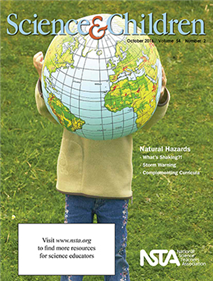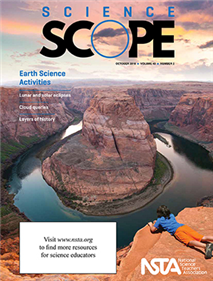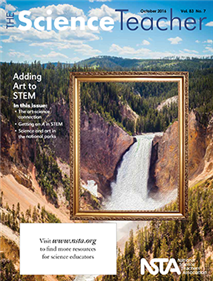All Resources
Journal Article
A design challenge requires students to create structures that can withstand a hurricane’s effects....
Journal Article
A fourth-grade ecology lesson connects science and social studies....
Journal Article
Students explore earthquakes and other natural hazards using technology....
Journal Article
In Our Neighborhood: Who's Been Here?
A project-based unit introduces third graders to the animals in their surroundings....
Journal Article
In this role-play activity, students act as superhero agents while learning the science behind a series of gadgets....
Journal Article
Editor's Note: Natural Hazards
Science and Children’s editor shares thoughts regarding the current issue....
Journal Article
The Early Years: Navigating Natural Disasters
This column discusses resources and science topics related to students in grades preK to 2. This month’s issue has students attempting to contain moving water and experience and use its force....
Journal Article
The Poetry of Science: Hurricanes
Building literacy in playful, meaningful ways. This poem about hurricanes helps students connect to ideas about changes in Earth's surface, emergency preparedness, and storms....
Journal Article
Teaching Through Trade Books: Forecasting Hazardous Conditions
This column includes activities inspired by children’s literature. Through the use of printed text and video resources, young students can begin to ask questions to learn about different types of weather, whereas older students can start to conside...
Journal Article
Science 101: What Causes Severe Thunderstorms and Tornadoes?
This column provides background science information for elementary teachers. This month’s issue discusses the mechanisms that create thunderstorms and tornadoes, which are almost identical....
Journal Article
Science 102: Raindrops Keep Falling
This column shares exercises to challenge content knowledge. This month's issue presents a new challenge and answers the Elucidating challenge from last month....
Journal Article
Engineering Encounters: Building a Spaghetti Structure
This column presents ideas and techniques to enhance your science teaching. In this month's issue an upper elementary STEM challenge brings an engineer into the classroom while emphasizing cooperation, communication, and creativity....
Journal Article
Earth History Theories: Relative Age Dating Lab With Additions for Mining and Mineral Exploration
Dig into this stratigraphy lab to learn how scientists assign ages to specific rock layers....
Journal Article
Exploring Lunar and Solar Eclipses Via a 3-D Modeling Design Task
Develop, enlarge, and refine students’ understanding of eclipse events with a 7E learning-cycle model....
Journal Article
From the Editor's Desk: Tying It All Together With Earth Science
Science Scope’s editor shares thoughts regarding the current issue....
Journal Article
The Four Strands of Science Learning and the Next Generation Science Standards
How you can create greater proficiency in your middle school classroom....
Journal Article
Teacher's Toolkit: Puzzle Boxes for 3-D Learning About Natural Hazards
This column provides how-to strategies and practical advice for the science teacher. In this month’s issue the author describes how he has modified his toy blocks and cubes lessons to introduce students to the nature of scientific research to have ...
Journal Article
Classic Lessons 2.0: Using Multiple Representations to Teach Science
This column shares updated perennial classroom favorites. This article demonstrates how teachers can use six major steps of using multiple representations to teach a difficult scientific concept, Moon phases, which many middle school students struggl...
Journal Article
Citizen Science: Clouds in the Classroom
This column highlights formal and informal science research projects that students can join and contribute to by gathering and sharing data. With Students’ Cloud Observations On-Line (S’COOL), you can bring the science of the skies to your classr...
Journal Article
Disequilibrium: Forming Clouds in the Classroom
This column shows how to use discrepant events to confront misconceptions. This month’s discrepant event allows students to model condensation, the portion of the hydrologic cycle in which water vapor condenses into liquid form and creates a cloud....
Journal Article
Teacher to Teacher: Phenomenal Engagement
This column provides practical advice from your peers. One way to engage middle school students is through the use of relevant scientific phenomena. A scientific phenomenon is something (such as an interesting fact or event) that can be observed and ...
Journal Article
Listserv Roundup: Finding and Saving Earth Science Resources
This column shares recent conversations taken from the NSTA listserv community about current science education topics. Learn about Earth science resources on NSTA e-mail listservs where there is an abundance of teacher-shared materials and websites r...
Journal Article
Science for All: Literacy Engagement and Its Role in the Science Classroom
This column shares strategies for increasing student engagement. This month's issues describes how to choose content-area reading materials with purpose....
Journal Article
Scope on the Skies: Connected Computing
This column focuses on astronomy throughout the year. This month’s issue discusses how students can partake in scientific research through distributed computing, where the computing for a research project is done on a network of computers in diffe...
Journal Article
Students create art inspired by extracurricular lab investigations....
Journal Article
Science and Art in the National Parks
Celebrating the centennial of the U.S. National Park Service....
Journal Article
Beginning a STEAM collaboration between art and chemistry students....
Journal Article
Sculpting the Barnyard Gene Pool
Immersing students in the science and engineering of chicken genetics and hatcheries....
Journal Article
Examining the effects of temperature on the metabolic rates of beetles....
Journal Article
Editor's Corner: Science and the Arts
The Science Teacher’s editor shares thoughts on the current issue....
Journal Article
Science 2.0: Students as Empowered Learners
This column shares web tools that support learning. This month’s issue discusses the Empowered Learner standard, which requires that “students leverage technology to take an active role in choosing, achieving, and demonstrating competency in thei...
Journal Article
Focus on Physics: Skateboard Physics
This column helps teachers build an understanding of physical principles. This month's issue uses physics to explain a skateboard move....
Journal Article
Health Wise: If Students Injure Their Heads
This Q&A style column provides up-to-date information on current health topics—helping students (and teachers) make healthy choices. This month’s issue discusses what happens when students get concussions....





